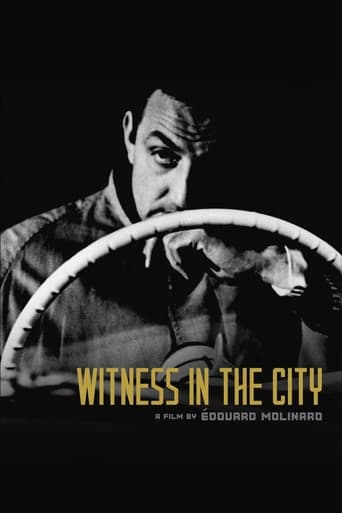kinsayder
A man (Lino Ventura) commits a murder, carefully staging it like a suicide. But there's a witness: a taxi driver who saw him leaving the scene of the crime. The loose end has to be tied up, and during the next 24 hours the killer stalks his victim through the streets of Paris, waiting for an opportunity to strike...This is my favourite Molinaro film. It has stuck in my memory since I first saw it about 20 years ago, largely due to the atmospheric night time Paris location work and Ventura's powerful, almost silent performance. He plays a villain here, but not an entirely unsympathetic one. The film cleverly opens with a sort of prologue in which we're shown that the man he kills murdered Ventura's wife and got away with it. This fact, along with the actor's natural charisma, gives us an instinctive sympathy for Ventura's predicament, even while he's hunting down an innocent man.The climactic chase involving a fleet of taxi cabs is well staged, giving the impression of an entire city uniting to destroy an unwanted presence in its midst. It ends, appropriately enough, amongst caged birds of prey.
christopher-underwood
This is an unusual French film from 1959, in that the wondrous Lino Ventura plays the bad guy and the 'Radio Taxi' outfit seem to play the police. Whilst this is a French homage to the US film noir, it still is very much its own with plenty of cafe stops, great night shots of Paris and perhaps unwisely and emphasis on humour rather than hard edged action, although there is some of that too. Always engaging, we see the immaculately organised Ventura do the dirty and then incredulously see him struggle to tie up one unfortunate loose end. I didn't feel that Ventura was comfortable as the baddie and he was not as convincing as he should have been so perhaps this is why his failings are almost treated as jokes. Uneven but certainly has some great moments and if the zoo scenes, at the end,don't quite work as well as they should, the absolute finale is a cracker.
dbdumonteil
This is really a minor work,but which retains a certain passé charm.The main asset of the movie is Henri Decae's cinematography ,as dazzling as usual.All the night scenes are impressive,the taxis gathering for the chase,the zoological garden with its nocturnal birds ,watching the fighting between the two men.The screenplay is somewhat disappointing,coming for two writers of Boileau-Narcejac calibre(Vertigo,les diaboliques).There are few surprises,unexpected twists,the Boileau-Narcejac trademarks .The very first scene shows Hitchcock's influence ("shadow of a doubt").Lino Ventura is cast against type because he rarely plays the villains.Perhaps which is to Molinaro's credit is his depiction of the taxi drivers.From their breakfast at dawn in the bistros where they enjoy coffee and croissants to the rooms where the operators send their messages to the drivers,these are charming vignettes of old Paris at the beginning of general De Gaulle mandate.Edouard Molinaro's best film remains "la mort de Belle"(1963).His career is essentially commercial,the likes of "la cage aux folles" and "l'emmerdeur" (which was to become Billy Wilder's "buddy buddy").
alice liddell
Excellent, very entertaining cat-and-mouse thriller, as an avenging husband (the incomparable Lino Ventura) tries to kill a witness to a murder. In its spare monochrome Decae photography, cool jazz soundtrack, nocturnal settings, focus on elaborate plot mechanics, and privileging of an unlovely outsider, the film is reminiscent of Melville. The 'villain' is only responding to a vicious circle of transgression and injustice, and his plight becomes an allegory for the lonely outsider locked out of a conformist society. The rigorous purity of Melville's aesthetic is softened by romance and comedy, but these only intensify the sense of impending tragedy.


